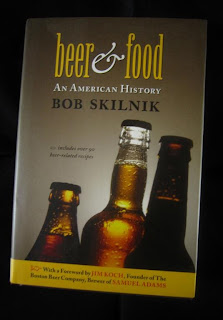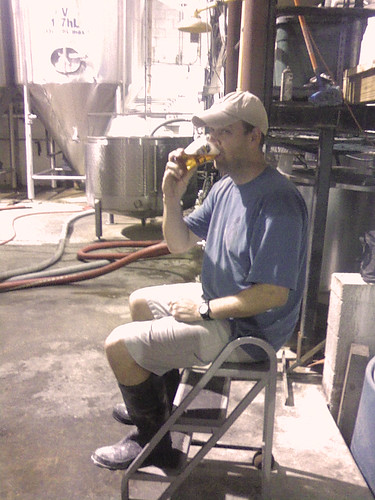The Washington Post published a story in its Sunday Magazine about a Cistercian monastery in Berryville, Virginia. The abbey is an hour or so west of Washington, D.C., but miles away in terms of sensibility and quiet. The Catholic monks practice a strict code of silence.
The Silent Treatment: A quiet vacation at Virginia's Holy Cross Abbey in the Shenandoah Valley
Rachel Manteuffel
Sunday, March 28, 2010
To help sustain the Holy Cross Abbey, rooms are offered for quiet retreat, and bread, honey, and jams are produced for sale.
In Belgium and the Netherlands, the Cistercians, also known as the Trappists, sustain their order by
producing beer. It's a time-honored tradition, dating back to the Middle Ages. Seven monasteries there still do so. Of their beers, Chimay is the most well-known, and Westvleteren the most acclaimed.
ADVISORY: This story was posted on April Fools Day. While the above information is true, what follows below is NOT TRUE. It's a wonderful hoax that's been circulating for nearly 20 years. Other than the introduction, I did not write the piece. I re-printed it with permission. Go here for the back story.
***************************************
Now, there's an eighth Trappist brewery, and it's here, in the U.S.
With scant fanfare, a Cistercian enclave in Arkansas began brewing 'Trappist-style' ales late last year. True to their calling, the Arkansan brothers plan to produce only enough to maintain the abbey and its small community. Contrary to their Belgian brewing brethren, they eschew a website. In fact, they prohibit photography in the brewery. But fortunately for us laity, the monks operate a brewpub on the abbey grounds, in which the rules of strict silence are not enforced.
Through a beery six-degrees-of-separation, I became acquainted with Brother James, the monastery's 'brewing brother.' Soon after the pub was opened to the public, he invited me for an inside the brewery tour. Here is an excerpt from an article written for publication.
It appears that Brother Patrick is taking a prayer break as I enter the Blessed Sacrament Brewpub at the edge of Stuttgart, Arkansas. When I take a seat on a simple wood stool, I see he's merely washing beer goblets behind the massive mahogany bar of the New World's first Trappist brewpub. Brother Patrick seems a lucky young man indeed; as bartender, he's permitted to speak in the course of his work, a lofty privilege in this bastion of silence and contemplation. "My privilege is not to speak," says the fresh-scrubbed 24-year-old as he neatly stacks clean goblets on the back bar, "but to serve and support our works."
Brother Patrick's discourse is interrupted by the entrance of a sprightly, robed figure, Brother James, the brewpub's 68-year-young founder and brewmaster. Brother James sweeps up his arms in welcome, then rushes up and vigorously shakes my hand in both of his. Before showing me around the premises, Brother James orders samples of his three regular beers, and a light lunch of dense, crusty bread slathered with a fragrant, soft goat cheese. Many of the kitchen's ingredients, including the bread and cheese, come from the adjacent Blessed Sacrament Monastery.
"The idea for this enterprise came about on a 2004 trip to Belgium, where I attended church meetings and became acquainted with Trappist ales," Brother James explains. The idea remained just that until August 2008, when the monastery--where Brothers James and Patrick and 25 other monks live and work--sought to capitalize a traditional Trappist craft venture with cash thrown off by its other activities.
Brother James was ready when the call came. He enrolled in the Diploma Course at Chicago's Siebel Institute of Technology and apprenticed at Abdij der Trappisten, brewer of Westmalle Trappist ales. "I selected Westmalle because they brew a full range of Trappist ales, from singel to tripel," says Brother James. He engaged a Belgian contractor to construct a traditional Trappist brewhouse from parts scrounged from the many small Belgian breweries that have closed in recent years. The first brews emerged in December 2009.
After lunch, Brother James leads me through the kitchen to the brewery, where robed brewery workers tend to a batch of the brewery's exquisite Tripel. High on a sea green, tiled wall a crucifix is prominently displayed in the fashion of Belgium's Trappist breweries. "It's very important that we adhere to tradition as much as practicable," says Brother James, gesturing toward the 50-hectoliter, solid copper, gas-fired kettle that was built in 1926 for Brouwerij Holjschmook, a 1986 victim of Belgium's pernicious trend of brewery consolidation. The large brewhouse was bought with an eye to wholesale trade, a prophecy already coming into play.
A stairway goes down to the fermentation room, where the heady perfume of young Trappist brews wafts from two rows of 100-hl open wooden fermenters. Another door opens onto a room whose walls are lined with kegs. One of the brewery's sole concessions to modernity, the stainless kegs sit silently conditioning before being served upstairs at the bar.
Blessed Sacrament Brewpub serves Dubbel and Tripel as well as Singel, a style that's usually not sold, but is traditionally consumed by Trappist monks with their meals. All are cask-conditioned, carbonated by priming with a hopped sugar solution and dispensed via beer engines. The beers are fermented with a mix of two strains of yeast, whose source Brother James declines to identify. All are hopped with Cascades and Kent Goldings, giving a nod to both Old and New Worlds. To obtain the proper flavor, Brother James purchases white and dark candy sugar from a Belgian supplier.
Singel is a delicately dry, herbal golden ale with original gravity 12° Plato (1048), 5.1% alcohol by volume and 22 bitterness units (BUs). It is made from pale malt and a small amount of white candy sugar. The beer undergoes two weeks of secondary fermentation and a week of warm conditioning in cask.
Dubbel is a chewy, yeasty brew made from pale and caramel malts and a proportion of dark candy sugar. This beer is maltier than the Singel, and has notes of currant and banana. Dubbel's two-hour boil over gas flame enhances its caramel notes. Secondary fermentation lasts two weeks, before reyeasting and two weeks' warm-conditioning. It has original gravity 16.5° Plato (1066), 6.4% alcohol by volume and 20 BUs.
Blessed Sacrament's Tripel is the best reason ever for a trip to Stuttgart, Ark. This immense beer has original gravity 22° Plato (1088), 9.8% alcohol by volume and 25 BUs. Tripel is brewed from pale malt and white candy sugar. It has an astonishing lack of alcohol flavor for such a strong brew. The beer receives a full three weeks of secondary fermentation and three weeks' warm-conditioning. It has a dry, flowery character, and more of the herbal notes that mark the Singel.
Brother James now leads me into a room set off from the primary fermenters. He closes the door. There I see another open fermenter, this one rectangular, topped with a huge head of barmy foam. And I certainly can smell it. Brother James sanitizes a sampling tube, dips it into the froth, and pours a small sample into a vial for me to taste. "We ferment this beer with a melange of airborne yeasts that we harvested in the open in Belgium," he tells me. In a nod to American sensibilities, the brothers have invested the brew with an elevated level of hops, estimating over 90 BUs. It tastes fruity, earthy, and barnyardy, redolent of a dog let into the house after a roll in the mud. "It's our 'wild' beer," he says, with an ever so Trappist hint of a chuckle. "We've named it 'Extreme Unction.'"
How did Stuttgart, Arkansas, accept its first brewpub? "At first the community was unsure of what we were doing. They began coming when we instituted Saturday night Bingo, and business slowly increased on other days of the week," Brother James says, adding that his establishment is closed Sundays. Just months after opening, the 75-seat bar and 120-seat dining room are often filled from dinner until closing at 11:00. And the brewpub is becoming a regular stop on Stuttgart's power circuit.
Demand for Brother James' beers is rising fast, to the point that he plans to purchase a bottling line and begin selling 75-cl corked bottles in area grocery stores. Until then, lucky patrons will hope to take home one of the few hand-bottled specimens. The brewery supplies kegs for parties and home use, and hopes to establish draft accounts in area bars.
Brother James strives to make a name for his products, and Trappist ales in general, by establishing a small number of key accounts. "We contacted fellow Arkansan Jerry Jones and he introduced us to the concessionaire at Cowboys Stadium. We believe our Singel will be sold at Cowboys games next season," he says.
Back at the bar, Brother James asks Brother Patrick to draw me a Tripel while the kitchen produces an asparagus and cheese omelet. The fresh flavors of food and beer meld exquisitely. I close my eyes and turn my head skyward, at peace with the notion that there is a heaven, and it may be right where I am sitting.
ADVISORY: This story was posted on April Fools Day. It is NOT TRUE. It's a wonderful hoax that's been circulating for nearly 20 years. Other than the introduction, I did not write the piece. I re-printed it with permission. Go here for the back story.
















